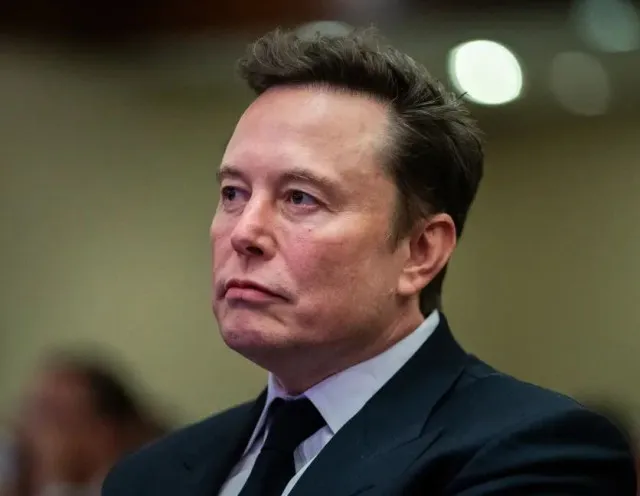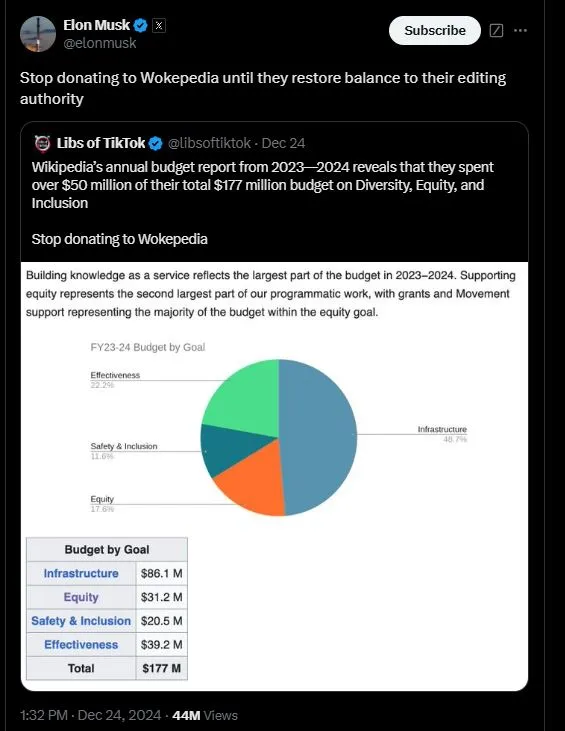Elon Musk, the outspoken billionaire and tech visionary, is no stranger to calling out organizations he finds questionable. This time, his target is none other than Wikipedia, the online encyclopedia beloved by millions worldwide. Musk recently made headlines for urging his supporters to reconsider donating to Wikipedia, citing the platform’s alleged $50 million spending on Diversity, Equity, and Inclusion (DEI) initiatives. Let’s dive into what prompted this backlash, what it means for Wikipedia, and the larger implications for nonprofits and their funding priorities.
Elon Musk’s Criticism of Wikipedia’s Spending

Elon Musk is no stranger to controversy, and his Twitter (now X) posts often spark intense debates. Recently, Musk publicly criticized Wikipedia’s alleged allocation of $50 million toward DEI programs. For many, this figure raised eyebrows, and Musk’s take was blunt: he questioned whether such a significant chunk of Wikipedia’s budget should be directed toward initiatives that don’t directly contribute to the platform’s core mission—providing free, unbiased knowledge to the world.
In his characteristic directness, Musk went further by advising his supporters to think twice before donating to Wikipedia. His rationale? He believes the funds could be better used to maintain and expand Wikipedia’s infrastructure, rather than focusing on DEI-related efforts, which he implied were unnecessary or excessive.
What Exactly Is DEI, and Why Is It Controversial?
Before unpacking the debate, it’s important to understand what Diversity, Equity, and Inclusion (DEI) means. DEI encompasses efforts to create an inclusive, equitable environment by addressing systemic disparities based on factors like race, gender, ethnicity, and more. While many organizations embrace DEI to foster inclusivity, critics like Musk argue that such initiatives can sometimes go overboard, diverting funds and focus from primary objectives.
For Wikipedia, a platform known for its crowdsourced, community-driven nature, dedicating $50 million to DEI efforts raises questions. Critics, including Musk, suggest that these funds could instead be invested in enhancing the platform’s accuracy, user experience, or accessibility. Supporters of DEI, however, argue that fostering inclusivity and representation is critical for a global knowledge-sharing platform.
The Financial Side: Wikipedia’s $50 Million Spending on DEI
The alleged $50 million DEI expenditure is at the heart of Musk’s criticism. Wikipedia is operated by the Wikimedia Foundation, a nonprofit organization funded entirely by donations. Each year, millions of users contribute financially, trusting that their money goes toward maintaining the encyclopedia’s servers, improving content accuracy, and expanding its reach.
The $50 million figure—if accurate—represents a substantial percentage of the organization’s budget. To put it into perspective, this is money that could fund infrastructure upgrades, support volunteer editors, or ensure the platform remains free for users worldwide. Musk and his supporters argue that such a large allocation to DEI projects could alienate donors who prioritize Wikipedia’s core mission over its social initiatives.
Is Wikipedia Losing Sight of Its Mission?
One of the key points in Musk’s critique is whether Wikipedia is staying true to its mission. As a resource built on the collaborative efforts of volunteers, the platform has always prided itself on neutrality and accessibility. However, critics claim that a focus on DEI might shift Wikipedia’s priorities away from providing free, unbiased knowledge.

Some users have expressed concerns that DEI initiatives could introduce ideological bias into the platform’s content or operations. They argue that neutrality, a cornerstone of Wikipedia, should remain paramount. On the other hand, DEI advocates believe that inclusivity enhances neutrality by ensuring all perspectives are represented fairly. The debate boils down to whether the pursuit of inclusivity is enhancing or undermining Wikipedia’s foundational values.
Public Reaction: Divided Opinions
As with most of Musk’s public statements, his criticism of Wikipedia sparked a firestorm of opinions online. Some of his supporters applauded his call for accountability, arguing that donors have the right to know how their contributions are being spent. Others, however, accused Musk of oversimplifying a complex issue and undermining an organization that provides an invaluable service.
Many questioned the $50 million figure itself, asking for transparency from the Wikimedia Foundation regarding how DEI funds are allocated. Is this number accurate? And if so, what specific programs and outcomes does it support? Transparency, as some users suggested, could help clarify whether these funds are justified or excessive.
Nonprofits Under the Microscope: The Larger Debate

Musk’s critique of Wikipedia touches on a broader issue facing nonprofits today: balancing their core mission with social responsibility. DEI has become a priority for many organizations, but the debate lies in how much focus and funding should be devoted to these initiatives.
For nonprofits like the Wikimedia Foundation, which rely on public donations, maintaining donor trust is essential. Transparency about spending—whether it’s on DEI, infrastructure, or community programs—is crucial to avoid alienating contributors. Musk’s criticism serves as a reminder that nonprofits operate in a world where financial scrutiny is more intense than ever.
Elon Musk’s Advice to Supporters
So, what exactly is Musk advising his supporters to do? He’s not suggesting abandoning Wikipedia altogether. Instead, he’s urging donors to ask tough questions about where their money is going. Musk’s stance is clear: if you’re contributing to a platform like Wikipedia, you should ensure your donation supports its primary mission.
He’s also encouraging a broader conversation about accountability and transparency in nonprofit organizations. While Musk’s methods often spark controversy, his underlying message—that donors deserve clarity—resonates with many.
The Path Forward for Wikipedia

Wikipedia has long been a symbol of free and open access to information. However, controversies like this one highlight the challenges of balancing progress with tradition. The Wikimedia Foundation may need to address the criticism head-on by providing more detailed financial reports and explaining how DEI spending aligns with its mission.
By fostering transparency and engaging in open dialogue with users and donors, Wikipedia can reaffirm its commitment to neutrality, inclusivity, and accessibility. Whether it’s through clearer communication or reevaluating funding priorities, the organization has an opportunity to strengthen its relationship with its global community.
Conclusion: A Call for Accountability
Elon Musk’s criticism of Wikipedia isn’t just about a $50 million DEI budget—it’s about the broader question of accountability. Nonprofits like the Wikimedia Foundation must strike a delicate balance between staying true to their mission and addressing evolving societal needs.
For donors, Musk’s advice serves as a reminder to stay informed and ask questions about where their contributions are going. And for Wikipedia, this moment offers a chance to reflect, engage with its community, and ensure its decisions align with its core values.
In the end, the goal remains the same: to keep Wikipedia as a trusted, unbiased resource for knowledge. How the organization navigates this controversy will shape not only its future but also the trust of the millions who rely on it every day.


